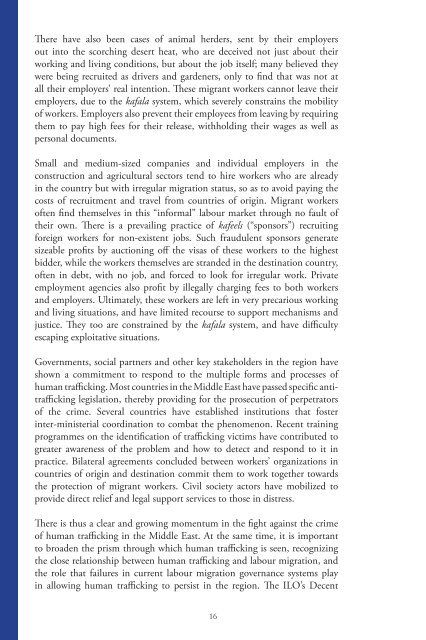Tricked and Trapped: Human Trafficking in the Middle East, ‎pdf 4.1 MB
Tricked and Trapped: Human Trafficking in the Middle East, ‎pdf 4.1 MB
Tricked and Trapped: Human Trafficking in the Middle East, ‎pdf 4.1 MB
You also want an ePaper? Increase the reach of your titles
YUMPU automatically turns print PDFs into web optimized ePapers that Google loves.
There have also been cases of animal herders, sent by <strong>the</strong>ir employers<br />
out <strong>in</strong>to <strong>the</strong> scorch<strong>in</strong>g desert heat, who are deceived not just about <strong>the</strong>ir<br />
work<strong>in</strong>g <strong>and</strong> liv<strong>in</strong>g conditions, but about <strong>the</strong> job itself; many believed <strong>the</strong>y<br />
were be<strong>in</strong>g recruited as drivers <strong>and</strong> gardeners, only to f<strong>in</strong>d that was not at<br />
all <strong>the</strong>ir employers’ real <strong>in</strong>tention. These migrant workers cannot leave <strong>the</strong>ir<br />
employers, due to <strong>the</strong> kafala system, which severely constra<strong>in</strong>s <strong>the</strong> mobility<br />
of workers. Employers also prevent <strong>the</strong>ir employees from leav<strong>in</strong>g by requir<strong>in</strong>g<br />
<strong>the</strong>m to pay high fees for <strong>the</strong>ir release, withhold<strong>in</strong>g <strong>the</strong>ir wages as well as<br />
personal documents.<br />
Small <strong>and</strong> medium-sized companies <strong>and</strong> <strong>in</strong>dividual employers <strong>in</strong> <strong>the</strong><br />
construction <strong>and</strong> agricultural sectors tend to hire workers who are already<br />
<strong>in</strong> <strong>the</strong> country but with irregular migration status, so as to avoid pay<strong>in</strong>g <strong>the</strong><br />
costs of recruitment <strong>and</strong> travel from countries of orig<strong>in</strong>. Migrant workers<br />
often f<strong>in</strong>d <strong>the</strong>mselves <strong>in</strong> this “<strong>in</strong>formal” labour market through no fault of<br />
<strong>the</strong>ir own. There is a prevail<strong>in</strong>g practice of kafeels (“sponsors”) recruit<strong>in</strong>g<br />
foreign workers for non-existent jobs. Such fraudulent sponsors generate<br />
sizeable profits by auction<strong>in</strong>g off <strong>the</strong> visas of <strong>the</strong>se workers to <strong>the</strong> highest<br />
bidder, while <strong>the</strong> workers <strong>the</strong>mselves are str<strong>and</strong>ed <strong>in</strong> <strong>the</strong> dest<strong>in</strong>ation country,<br />
often <strong>in</strong> debt, with no job, <strong>and</strong> forced to look for irregular work. Private<br />
employment agencies also profit by illegally charg<strong>in</strong>g fees to both workers<br />
<strong>and</strong> employers. Ultimately, <strong>the</strong>se workers are left <strong>in</strong> very precarious work<strong>in</strong>g<br />
<strong>and</strong> liv<strong>in</strong>g situations, <strong>and</strong> have limited recourse to support mechanisms <strong>and</strong><br />
justice. They too are constra<strong>in</strong>ed by <strong>the</strong> kafala system, <strong>and</strong> have difficulty<br />
escap<strong>in</strong>g exploitative situations.<br />
Governments, social partners <strong>and</strong> o<strong>the</strong>r key stakeholders <strong>in</strong> <strong>the</strong> region have<br />
shown a commitment to respond to <strong>the</strong> multiple forms <strong>and</strong> processes of<br />
human traffick<strong>in</strong>g. Most countries <strong>in</strong> <strong>the</strong> <strong>Middle</strong> <strong>East</strong> have passed specific antitraffick<strong>in</strong>g<br />
legislation, <strong>the</strong>reby provid<strong>in</strong>g for <strong>the</strong> prosecution of perpetrators<br />
of <strong>the</strong> crime. Several countries have established <strong>in</strong>stitutions that foster<br />
<strong>in</strong>ter-m<strong>in</strong>isterial coord<strong>in</strong>ation to combat <strong>the</strong> phenomenon. Recent tra<strong>in</strong><strong>in</strong>g<br />
programmes on <strong>the</strong> identification of traffick<strong>in</strong>g victims have contributed to<br />
greater awareness of <strong>the</strong> problem <strong>and</strong> how to detect <strong>and</strong> respond to it <strong>in</strong><br />
practice. Bilateral agreements concluded between workers’ organizations <strong>in</strong><br />
countries of orig<strong>in</strong> <strong>and</strong> dest<strong>in</strong>ation commit <strong>the</strong>m to work toge<strong>the</strong>r towards<br />
<strong>the</strong> protection of migrant workers. Civil society actors have mobilized to<br />
provide direct relief <strong>and</strong> legal support services to those <strong>in</strong> distress.<br />
There is thus a clear <strong>and</strong> grow<strong>in</strong>g momentum <strong>in</strong> <strong>the</strong> fight aga<strong>in</strong>st <strong>the</strong> crime<br />
of human traffick<strong>in</strong>g <strong>in</strong> <strong>the</strong> <strong>Middle</strong> <strong>East</strong>. At <strong>the</strong> same time, it is important<br />
to broaden <strong>the</strong> prism through which human traffick<strong>in</strong>g is seen, recogniz<strong>in</strong>g<br />
<strong>the</strong> close relationship between human traffick<strong>in</strong>g <strong>and</strong> labour migration, <strong>and</strong><br />
<strong>the</strong> role that failures <strong>in</strong> current labour migration governance systems play<br />
<strong>in</strong> allow<strong>in</strong>g human traffick<strong>in</strong>g to persist <strong>in</strong> <strong>the</strong> region. The ILO’s Decent<br />
16
















